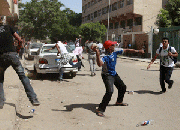| Egyptian youth to military rulers: we want real cleansing, real trials, real government |
CAIRO — Five months after the ouster of president Hosni Mubarak, Egyptians are being asked to return to the streets for new mass protests amid frustration over the military rulers’ handling of a promised transition to democracy.
Hailed as heroes for not siding with Mubarak during the January 25 uprising, the ruling military council has increasingly become the target of protesters’ anger.
Pro-democracy activists have expressed their fury over continued military trials of civilians.
They say police officials responsible for repression before and during the revolt are still showing up for work.
And some take issue with the military’s timetable for elections and the drafting of a new constitution.
“We want real cleansing, real trials, real government,” said the Coalition of Revolution Youth, a grouping of pro-democracy movements that helped launch the revolt.
“I want to see real change,” said Mustafa Shawki, one of the coalition members in a video posted on their Facebook page. “We must be clear, politics is not for the army.”
Another Facebook group “We are all Khaled Said” — named after a man who died after being beaten by police last year and has become a symbol of the fight against police brutality — insisted that “this country must change.”
The group, which has nearly 1.5 million members said “those found guilty of corruption must be brought to justice.”
The National Association for Change, founded around leading dissident and former UN nuclear watchdog chief Mohamed ElBaradei, called for an end to “the repressive methods of the old regime.”
Rallies are planned around the country on Friday, July 8, including in Cairo’s Tahrir Square — the epicentre of the protests that toppled Mubarak in February.
The powerful Muslim Brotherhood said Wednesday it would take part in the protests after initially announcing it was staying away.
“The Brotherhood has decided to participate in the demonstration on July 8 (aimed at) raising the flag of justice so that all rights can be regained, and all criminals punished and all the demands of the revolution met,” it said in a statement.
The Brotherhood initially disassociated itself from the demonstration because one of the rally’s earlier demands was to call for a new constitution before legislative elections in September.
The military council has set parliamentary elections for September, but some fear early polls will benefit the well organized Muslim Brotherhood.
Others have called for a new constitution before elections, so as not to give the Islamist group too much influence in drafting the charter.
The military council’s number two, General Sami Enan, has vowed the elections will be “free and fair”.
Fundamentalist Salafi groups also said they would join Friday’s protest, listing the same demands as the secular pro-democracy groups.
The protest comes amid heightened tensions in Egypt almost five months since a popular uprising forced president Hosni Mubarak to stand down after three decades of autocratic rule.
Last Monday, clashes erupted in Cairo when a court bailed seven police officers accused of killing protesters during the revolt, reviving the anger of activists who demand that the police be brought to justice.
On Wednesday morning, Cairo’s iconic Tahrir Square appeared much as it did during the 18-day uprising that led to the ouster of former president Hosni Mubarak. Tear gas lingered in the air, hastily erected metal barricades blocked access roads, and the streets were littered with chunks of pavement, broken glass and spent tear gas canisters.
“It was January 25 all over again,” said one man nursing a bandaged arm, referring to the historic day that Egypt’s uprising began. “Mubarak is gone, but nothing has changed. The police are still using the same brutal tactics.”
Routine police torture and abuse during the Mubarak era was a driving force behind the January 25 uprising.
Last week, violent clashes erupted around Cairo, culminating in a confrontation in Tahrir Square between the police and around 4,000 protesters including families of some of those who died during the anti-regime protests.
The clashes began during a memorial service for people killed during the revolution after a group of the victims’ families arrived to complain that they were not invited to the ceremony. A scuffle broke out when the group tried to force its way into the theatre where the service was being held.
Eyewitnesses say police beat and arrested the families who had been barred from joining the service. One video taken near the theatre and quickly posted on YouTube allegedly shows an unarmed relative of a revolution martyr being tackled to the ground, beaten and tasered by a group of police and plainclothes officers.
“When I saw that video it made my blood boil,” says student Randa Hashem.
The Supreme Council of the Armed Forces — led by Mubarak-era defense minister Field Marshal Hussein Tantawi — has sought to calm the situation by announcing the creation of a fund to assist victims’ families, which it said on Monday would be worth about $16 million.
Many Egyptians are frustrated by the slow pace of reform since the military removed Mubarak in February. They are particularly angered by the perceived laxity in prosecuting former regime officials who orchestrated attacks on protesters during Egypt’s uprising that left at least 846 dead and 6,400 injured.
Only one police officer accused of killing protesters has been sentenced. He was tried in absentia and is still at large.
The glacial pace of trials involving senior officials from the former regime contrasts with the hasty trials of citizens arrested since the start of the uprising.
The increasing number of military trials — up from 7,000 to 10,000 since February according to local and international human rights groups — has further enraged pro-democracy activists, who have made the end of military trials for civilians a key demand of Friday’s protest.
(MEO) (IPS) (TAAN)






Leave a Reply